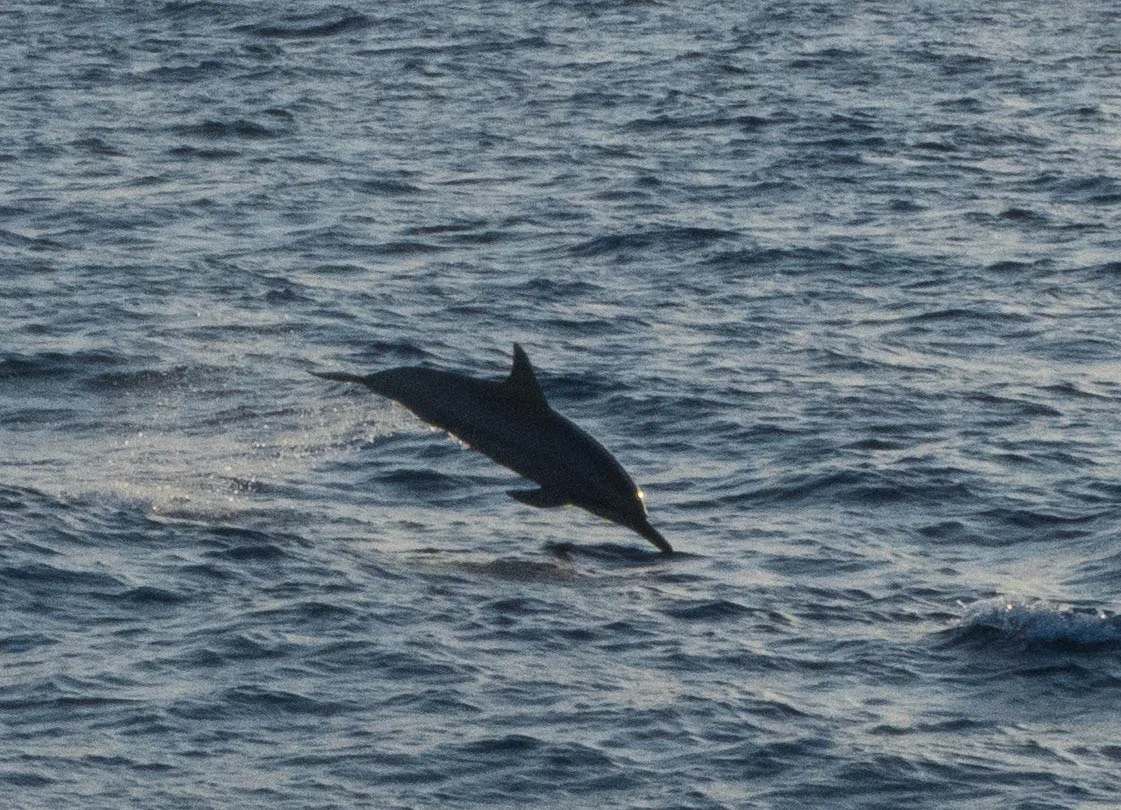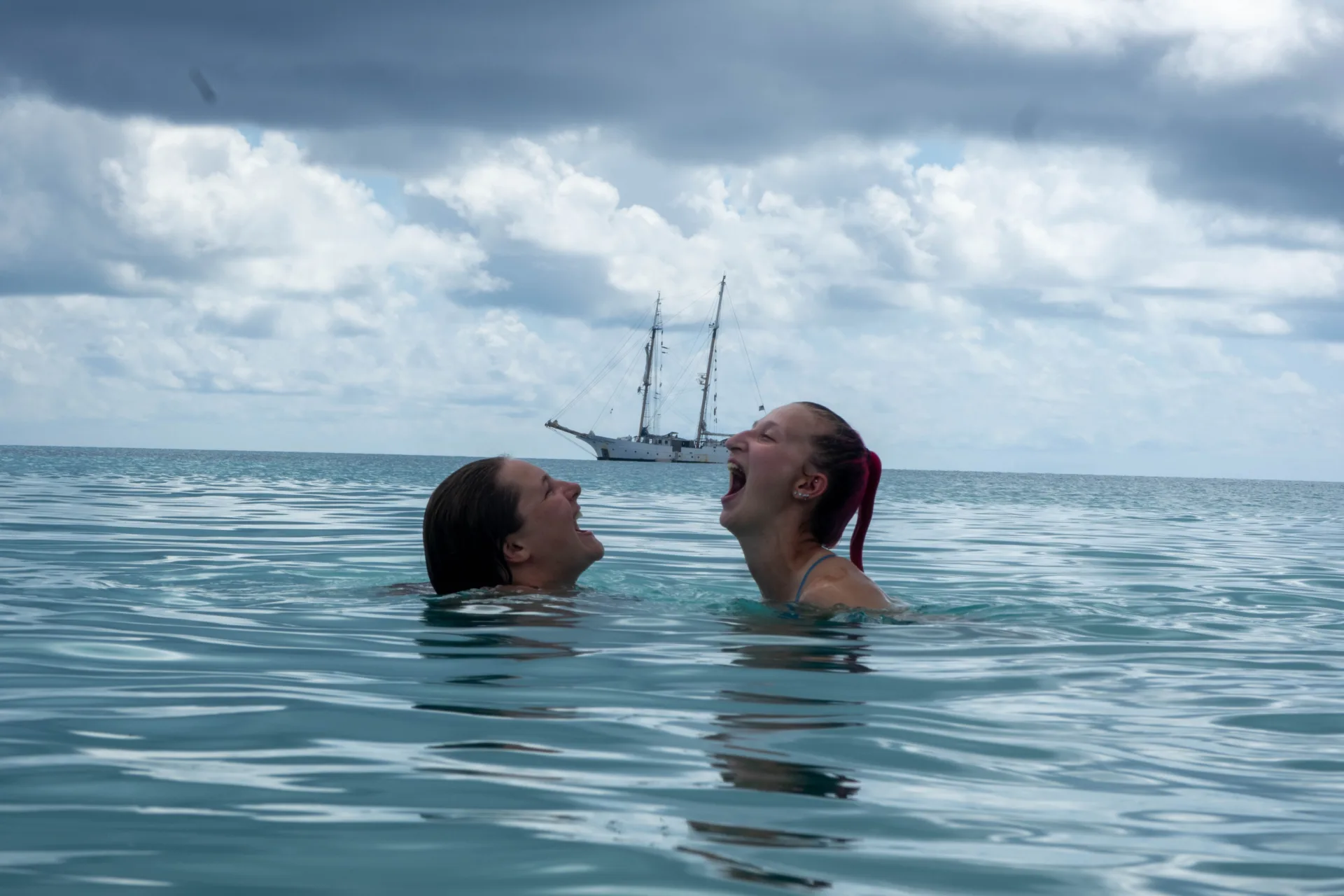Programs Blog
Here Be Marine Mammals

16 November 2024
Location: South Pacific Ocean
Weather: 3/8 clouds, blue skies, 26˚ C
I’m currently sitting in the library with my harness on since I’m on afternoon watch right now. We’ve been able to get work done during watches now since science data collection ended, and there isn’t much left to do in lab. I’m deck crew today, but we’re currently hove-to because we’re sending Styrofoam cups down 2400 meters to watch them shrink under pressure. Science! The wire has been going for the past four hours so I’m glad I’m on deck today. We’ve been doing a workout every 100 meters of wire so let’s just say you’ll have a hard time recognizing me once it’s over.
I’ve chosen to write about marine mammals that we’ve seen so far throughout our journey. I regret to inform you all that other than our first day of being underway, I have not seen any marine mammals. However, I was at the helm leaving Port Denarau for the first time (there were too many departures and arrivals to keep track of) when a pod of dolphins approached us, leaping through the wake from our bow. I knew I had to stay focused on steering but I peeked away to get a good look at them. The sun was just setting, we had just gotten underway that day, and I swear there were rainbows and butterflies as well. The moment was too perfect to describe and almost seemed fake. Apparently there have been two other separate sightings of dolphins, but I was not there to witness them so I’d like to believe it was made up.
When I began to think about how I wanted to respond to this blog prompt, I thought I would have much more to go off of when the time came to actually write it. Since that is not the case I figured I would look elsewhere: onboard. A marine mammal is technically defined as a mammal that spends over 50% of its life in or around the ocean, relying on it for food and habitat. If you accept this definition then you could consider all of the crew aboard the Robert C. Seamans as marine mammals, at least for the sea component of our semester. We have called the seas our home for the past six weeks, other than a few port stops in Denarau, Tuvalu, and Savusavu. We were still spending our time on the ship at these port stops, just docked or anchored; Bobby C. was still where we returned at night for shelter. At times, we use the wind to determine our course, we fish from the waters around us, and we play in the swells that rock us around. All of these actions can be compared to true marine mammals. Last week (I don’t have any sense of time actually), we were doing a steady 8 knots for a while so we gained some time to mess around before we have to be in New Zealand for the end of the program. We took this opportunity to solely rely on the wind to carry us to our destination, and we haven’t had the engine on for some time now. As Cap put it, we have “money in the bank.” Slowly our savings dwindled but for now I will enjoy the idea of fully sailing (this also makes boat checks quicker when there are no engine numbers to record). Furthermore, the fish Avery caught a while back was a barracuda and gathered quite a crowd on deck. We all watched as the fish was gutted and fileted. A few of us tried some of the fresh meat, but it was not as good as I thought it would be. We are living like marine mammals (take that with a grain of salt).
Update: It is now the next morning and when watch was turned over to us early this morning, Anika informed us of seeing a whale about an hour before we took the deck. I was thinking during writing this that I would jinx our luck and that is exactly what happened. Good for us, I guess.
I’d like to shout out my family, friends in HI, and Fiona; I look at pictures from the past and can’t wait to see you all again! I have so much to share.
Also hi to Katherine’s mom!
Sophia Weinstock, Hawaii Pacific University

Recent Posts from the Ships
- Ocean Classroom 2024-A collaborative high school program with Proctor Academy
- Collaborations and Long-term Commitments: SEA’s Caribbean Reef Program Sets a Course for Coastal Programs that Compliment Shipboard Experiences.
- Sea Education Association students prepare for life underway using state of the art nautical simulation from Wartsila Corporation.
- SEA Writer 2022, Magazines From the Summer SEA Quest Students
- Technology@SEA: Upgrades Allow Insight into Ocean Depths
Programs
- Gap Year
- Ocean Exploration
- High School
- Science at SEA
- SEA Expedition
- SEAScape
- Pre-College
- Proctor Ocean Classroom
- Protecting the Phoenix Islands
- SPICE
- Stanford@SEA
- Undergraduate
- Climate and Society
- Climate Change and Coastal Resilience
- Coral Reef Conservation
- Marine Biodiversity and Conservation
- MBL
- Ocean Exploration: Plastics
- Ocean Policy: Marine Protected Areas
- Oceans and Climate
- Pacific Reef Expedition
- The Global Ocean: Hawai'i
- The Global Ocean: New Zealand